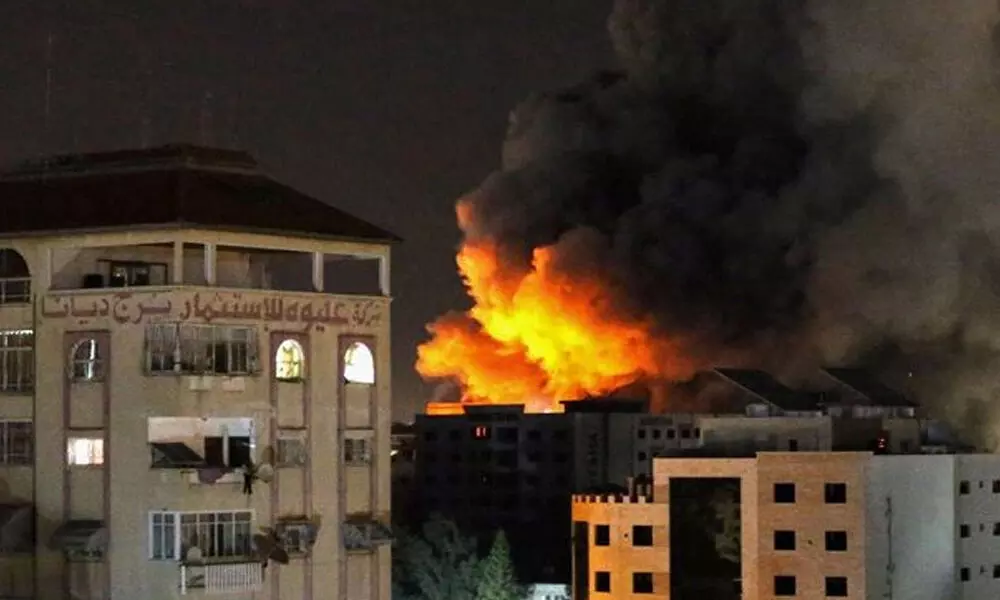Alienating new allies, Israel amplifying old foes?
If any Palestinians placed faith in the glass-half-full view of the Abraham Accords, it was shattered by the events of the past weekend
image for illustrative purpose

WHEN the United Arab Emirates and Bahrain signed the Abraham Accords with Israel last fall, a desultory attempt was made to persuade Palestinians that they would gain from the diplomatic breakthrough. The immediate benefit was that, as part of the deal, Prime Minister Benjamin Netanyahu had agreed to freeze a plan to annex much of the West Bank. Over the longer term, the new comity would allow the Arab States to coax Israel into giving Palestinians a fairer shake. To Netanyahu, however, the accords were only ever about gaining recognition from the Arab States for Israel. He did not feel obliged to seek, much less heed, their counsel on dealings with the Palestinians.
This was a blunder. In failing to use Israel's newfound friends to help improve relations with the Palestinians, Netanyahu has empowered an old enemy: Iran. The Islamic Republic, already a powerful presence in Gaza through its patronage of the extremist group Hamas, is capitalising on the latest Israeli-Palestinian clashes to interject itself into the discussion in the West Bank.
If any Palestinians placed faith in the glass-half-full view of the Abraham Accords, it was shattered by the events of the past weekend. The Arab signatories — which now include Morocco and Sudan — failed to restrain their new ally from storming the Al-Aqsa Mosque, one of Islam's holiest shrines, on one of the holiest nights of the Ramadan fasting period. Nor had they, or any of the others contemplating better relations with Israel, been able to persuade their old ally, the US, to intervene before matters got out of hand.
The Arab signatories could only issue pro forma condemnations of Israel. The most Palestinians can expect from their traditional Arab backers is that videos of riot police firing stun grenades inside Al-Aqsa will sour the accords for countries that haven't already signed, such as Saudi Arabia, Kuwait and Oman.
Netanyahu's own defiant response provided no indication that the diplomatic breakthroughs affected his behavior in any way. Addressing "our best friends," he maintained that, "Jerusalem is our capital and we will continue to build there."
Stepping into this breach is Iran, with real and rhetorical firepower. Its rockets, fired by Hamas and Islamic Jihad, have rained down on Israel this week, some of them evading the vaunted Iron Dome missile defense system to kill at least six Israeli civilians. The Israelis have fired back, killing more than 40 Palestinians.
In the meantime, Iran's Supreme Leader Ali Khamenei has launched a series of verbal volleys, describing Israel as a "terrorist base," and decrying the Arab States for signing the accords. He has called on Palestinians to build up their fighting power, arguing that Israelis "understand nothing but the language of force." His rallying cry has been taken up by a chorus of hard-liners in Tehran, where the Palestinian cause will provide useful grist during this summer's presidential election campaign. (Hard-liners are expected to perform well.)
To underline Iran's support, Foreign Minister Jawad Zarif has spoken with the Hamas leadership and has flown to Syria to "discuss developments in Israel and the Gaza Strip," with the regime of dictator Bashar al-Assad.
Until now, Iran's influence has had little influence in the West Bank, where the ruling Fatah faction of Palestinian Authority President Mahmoud Abbas has traditionally enjoyed the backing of the Arab States. But like his patrons, the aging and infirm Abbas has been AWOL in recent days. He dares not face his own people, as plans for a long-delayed general election this year have been shelved.
Even before last weekend's clashes in East Jerusalem, Tehran had its eye on the leadership vacuum in the West Bank. The Arab States, with their economic might and political clout, are crucial to preventing that from happening. By ignoring them and inflaming the Palestinians, Netanyahu has put Israelis in greater peril.

